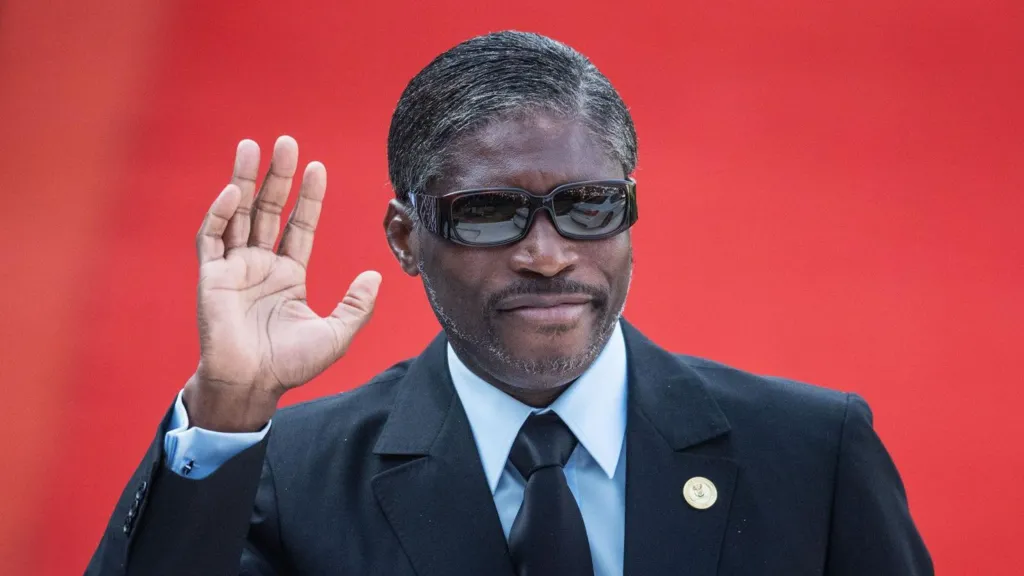Equatorial Guinea VP warns against office sex after viral videos
3 min read
Teodoro Obiang Mangue said that anyone having sex at work would be suspended (file photo). AFP

Teodoro Obiang Mangue said that anyone having sex at work would be suspended (file photo). AFP
Equatorial Guinea’s vice-president, Teodoro Obiang Mangue, has issued a stern warning following the circulation of several explicit videos that show civil servants engaging in sexual acts in their offices. The videos, which have gone viral online, reportedly feature high-ranking official Baltasar Ebang Engonga engaging in sexual activities with various women, including the wives of influential government figures. Engonga, who serves as the head of the National Financial Investigation Agency, is also a relative of the country’s president.
In response to the scandal, Vice-President Obiang stated that any civil servants caught engaging in sex acts in the workplace would face “severe measures.” He emphasized that such behavior constitutes a “flagrant violation of the code of conduct” and is unacceptable in any professional setting. As part of the crackdown, Obiang has ordered the installation of surveillance cameras in government ministries and courts to monitor for “indecent and illicit acts.”
The Vice-President’s office issued a statement, describing the leaked videos as deeply damaging to the country’s image. The statement further revealed that an investigation into the matter would be opened. Obiang’s comments follow the widespread public outrage and criticism that the videos have sparked, as they are believed to have tarnished the reputation of the government.
The videos were reportedly leaked after Engonga was arrested on unrelated corruption charges. State television TVGE reported that the explicit footage began circulating on social media following his arrest. The leak has ignited widespread controversy, with many questioning the actions of the civil servant, especially given his prominent role in the country’s anti-corruption efforts. Engonga, who is responsible for investigating financial crimes like money laundering as head of the National Financial Investigation Agency, is now at the center of an embarrassing scandal.
The government’s response to the scandal has included actions to curb the spread of the videos online. Last week, Vice-President Obiang acknowledged that “pornographic videos” had flooded social media platforms and ordered telecom companies to take immediate action to limit the distribution of the explicit material. This has led to significant disruptions in internet services, with residents of Equatorial Guinea reporting difficulties accessing the internet and downloading images, particularly since the crackdown began.
Equatorial Guinea’s chief prosecutor, Anatolio Nzang Nguema, also weighed in on the situation, suggesting that if Engonga was found to have contracted a sexually transmitted disease, he could face prosecution for offenses related to “public health.” This warning underscores the seriousness with which the government is treating the scandal, not just for its moral implications but also for its potential health and public safety concerns.
Engonga, who is reportedly known by the nickname “Bello” due to his physical appearance, has yet to comment publicly on the situation. However, he did share a post on his Facebook page following the release of the videos. In the post, he expressed feelings of sadness, accompanied by a photo of himself with a woman and children, with the caption, “Family is everything.”
The incident has raised broader questions about the conduct of public officials in Equatorial Guinea. With allegations of misconduct, including office sex and corruption, coming to light, the country’s leadership is under increasing pressure to maintain discipline within its ranks. The installation of surveillance cameras and increased monitoring of government offices are seen as part of a broader effort to restore public trust in the government’s integrity.
Despite the attention surrounding the scandal, the government’s efforts to clamp down on internet traffic and prevent the videos from spreading further highlight the lengths to which it will go to manage the fallout. For now, the viral videos continue to dominate public discourse, with many citizens in Equatorial Guinea discussing the implications of the incident and its potential effects on the country’s image both domestically and internationally.
The case of Baltasar Ebang Engonga underscores the intersection of personal misconduct, public responsibility, and the role of the internet in shaping political and social narratives. As investigations into the scandal unfold, it remains to be seen how the government will address these issues moving forward and what consequences, if any, will be faced by those involved.